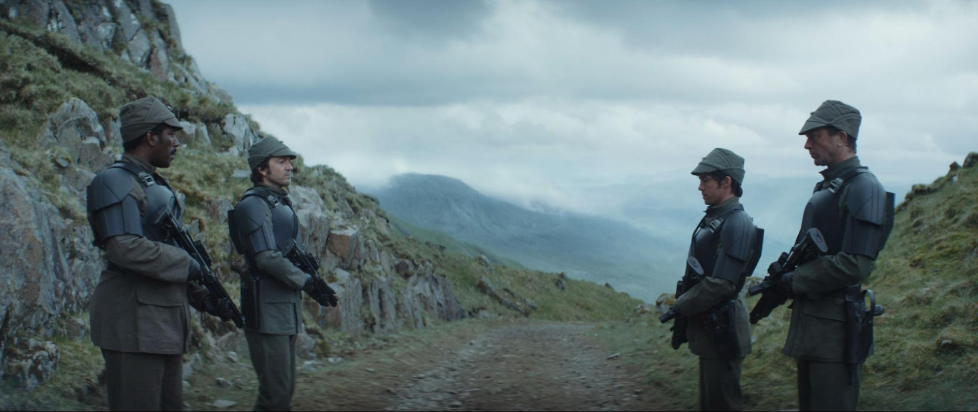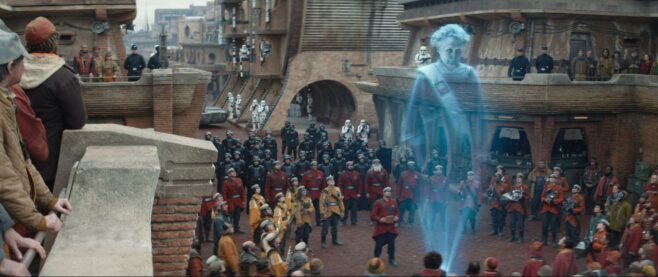
Star-Crossed Politics
Star Wars fans in America and across the globe applaud Andor‘s call for resistance against fascist power. Their moral compass tells them that Cassian Andor is on the right side even though he disrupts the status quo by organizing with rebels. Yet, this support doesn’t always extend to those taking direct action in earthly geopolitics. Palestinians fighting for survival against the Empire on their own planet are villainized by the media, politicians, and the public alike.
I don’t expect the audience to show empathy by watching theatrical politics when reports, citizen journalism, and first-hand accounts show the workings of occupation, but such dissonance is jarring. Andor‘s creator reflects on human history in this science fiction, but fails to understand their own message too.
Andor was released in September 2022, not long after the American public spoke up about defunding and abolishing the police when George Floyd was killed, and the ethnic cleansing of Palestinians and settler colonialism in Sheikh Jarrah. However, its showrunner Tony Gilroy cited other inspirations for this Star Wars story when Deadline asked him about the Season 1 finale. The people of Ferrix, Andor’s hometown, violently rise against Stormtroopers and riot-geared enforcement sent by Coruscant officials in this episode.
Gilroy said, “… this is the Russian Revolution. This is the Montagnard. This is something interesting that happened in the Haitian Revolution. This is the ANC. Oh, this is the Irgun Building, Palestine. This is the Continental Congress.” Irgun is a Zionist (Israeli nationalist ideology at odds with Palestine) terrorist group that bombed a hotel in Jerusalem and committed the Deir Yassin massacre during the Nakba in 1948, killing over a hundred Palestinians. According to Britannica, Irgun disbanded and pledged to the Israel Defense Force – the military that is actively committing war crimes in Gaza and the West Bank.
Also, when Nerdist asked Gilroy about the character Luthen, a revolutionary leader in Andor, Gilroy refused to speak about his own beliefs, but said the following about Luthen: “So that is an age old question: who’s a terrorist and who’s a freedom fighter? There’s a lot of people that think Thomas Jefferson or Nelson Mandela was a terrorist. Or the building of Israel is built on terror.” Comparing Nelson Mandela, who was anti-apartheid and considered a terrorist by the US, to Israel, an actual apartheid state that is funded by American tax dollars, is bizarre.

It’s even more absurd hearing Nemik, a rebel in Andor, giving speeches on the “Imperial thought machine” and fighting it by any means because “the Empire has no moral boundaries,” while local, national, and international news outlets uncritically share Israel and American propaganda that disparages pro-Palestine protesters calling for “resistance by any means necessary.”
Before the rebels infiltrate the Imperial garrison on Aldhani, a Commandant and Colonel of the Empire joke about manipulating the Dhani people to steal their land, which reassures us that the rebels’ attacking the Empire’s establishment is justified. If only this sort of hand-holding could get the audience on the same page to call for a ceasefire and a free Palestine.
One may say that what happens on screen isn’t the same as reality, but human history inspires so much of space and fantasy media. Characters take matters into their own hands, direct action is meant to inconvenience the oppressor while acting as a wake-up call to those who sit silent. This sort of entertainment media will not radically change perspectives if people already lack the conscience to understand the inequity surrounding them. Still, if you don’t condemn defiance on screen, then why do you in real life? That’s something worth reflecting on.
When our governments spread disinformation to dehumanize Palestinian lives, it has become necessary to educate ourselves and others. President Biden telling student protestors who were organizing encampments to push their universities to divest from Israel that “dissent must never lead to disorder” is a reminder that the line between democracy and fascism blurs more every day. And when the US government brings Israel supporter Mark Hamill to the White House podium to endorse Biden on May the Fourth, remember that even someone who plays the role of a Jedi master of the Rebel Alliance isn’t to be trusted.
Discordance isn’t limited to the audience – it’s the cast, the directors, politicians, everyone who sees the horror beyond comprehension, worse than any fictional villain could do, who still defend tyranny. Emperor Palpatine is clearly evil, but it’s disappointing how if some Americans lived in this space fantasy, they’d probably be siding with his immoral Empire.
———
Saniya Ahmed is a freelance writer who loves talking about sci-fi, history, culture, and art influences in videogames.





